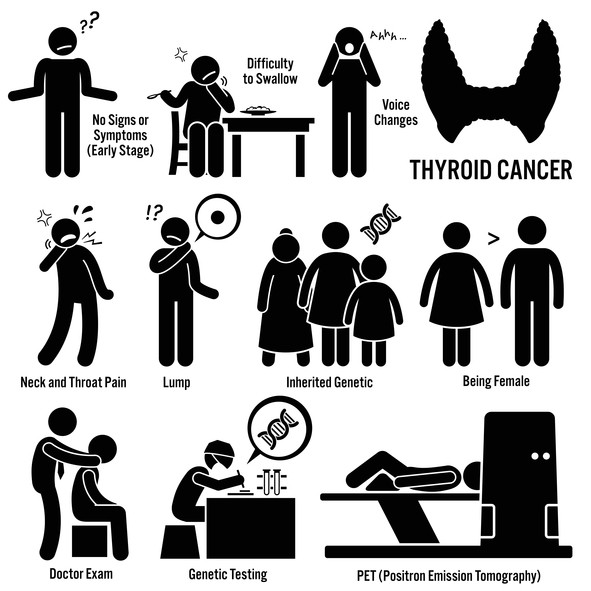Home » Thyroid Cancer
Thyroid Cancer

About Thyroid Cancer
Thyroid cancer disease is created when cancer cells develop in the tissues that build the thyroid.
It is a type of cancer that can be fully cured provided it is diagnosed in early stage. At times, this can be an aggressive cancer if the patient has been diagnosed with a metastatic stage 4 disease, meaning the tumor has spread (metastasized) to other organs than the Thyroid itself.
To improve patients’ chances, the American Society for Clinical Oncology, ASCO, that includes various specialists in its panel, such as oncologists, radiologists and other experts oncologists to inform Thyroid Cancer patients in all topics related to clinical trials in every stage of their disease.
The National Cancer Institute, NCI, of the United States, stresses that for part of Thyroid Cancer patients, the preferred treatment option is to join one of the many clinical trials around the world and thus increase the chances of success over the standard protocols.
Types of Thyroid Cancer
- Papillary carcinoma – Considered to be the most common type. The disease is most prevalent in women over the age of 30, and there is another group of children who will also get sick. In non-metastatic stages, full cure can be achieved.
- Follicular carcinoma – Less common type and most cases occur in young or adult patients. In non-metastatic stages, full cure can be achieved.
- Medullary carcinoma – Considered rare and inherited genetic.
- Anaplastic carcinoma – Considered rare and most commonly develops in old age.
- Thyroid lymphoma – Lymphoma of the thyroid gland or NHL, Non-Hodgkin Lymphoma – Considered to be a cancer whose source is in lymphoid cells found in the thyroid gland. The cancer originates from the body’s immune system and is usually defined as non-Hodgkin’s lymphoma
Causes of Thyroid Cancer
- More women than men
- Radiation exposure
- Previous thyroid disorders such as hipothyroidism or hyperthyroidism
- Family History – For example, Familial adenomatous polyposis syndrome, or 2 Multiple endocrine neoplasia syndrome, Werner syndrome, Carney complex or Cowden’s syndrome
Symptoms of Thyroid Cancer
- In the early stages there will be no sign or symptoms
- Difficulty to swallow
- Voice change
- Neck and throat pain
- A lump in the throat or neck area

Treatment Goals
The goal of treating local cancer, not metastatic, is to remove and eradicate the tumor completely.
In metastatic stage 4 disease, the primary objective of the treatment is to slow down and control disease progression and help reduce symptoms as well prolong life and improve patient’s quality of life.
Standard Treatments
A number of therapies are optional, and many patients shall receive more than one type of therapy.
Treatment options for thyroid cancer depend on several factors, like a patient’s overall health, extend of disease and whether the cancer has spread.
Surgery
The purpose is to remove the tumor and the area adjacent to it. The tumor will be studied under the microscope to identify and diagnose the type of cancer.
Two main types of treatment may be offered to patients before and after surgery
-
Treatment prior to surgery is known as ‘Neoadjuvant’
Usually this stage of treatment will involve chemotherapy and/or radiotherapy intended to reduce the tumor’s size and improve the success of surgery.
-
Post-surgery treatment, also known as ‘Adjuvant’
This treatment seeks to cure and prevent the appearance of metastases or recurrence of the tumor.
Radioactive Iodine, Radioiodine
The thyroid gland absorbs nearly all of the iodine in our body. Because of this, radioactive iodine (RAI, also called I-131) can be used to treat thyroid cancer. The RAI collects mainly in thyroid cells, where the radiation can destroy the thyroid gland and any other thyroid cells (including cancer cells) that take up iodine, with little effect on the rest of the body.
This treatment can be used to destroy any thyroid tissue not removed by surgery or to treat some types of thyroid cancer that have spread to lymph nodes and other parts of the body.
Radioactive iodine therapy cannot be used to treat anaplastic (undifferentiated) and medullary thyroid carcinomas because these types of cancer do not take up iodine.
Radiation
Radiations use high energy to destroy cancer cells or slow their growth.
This type of radiation is usually used to treat medullary thyroid cancer and anaplastic thyroid cancer. For iodine cancers, radioactive iodine treatment is usually a better treatment.
Radiation therapy is usually given 5 days a week for several weeks. Before starting the treatment, the medical team will make careful measurements to find the right angles to the radiation and the appropriate radiation dose. The treatment itself is not painful. Each treatment lasts only a few minutes, though the setting time – your preparation for treatment – usually takes longer.
Chemotherapy
Chemotherapy is a treatment aimed at shrinking and eliminating cancer cells and achieve disease control.
Chemotherapy has severe side effects when its effectiveness is inadequate, especially in metastatic stage 4 disease.
Chemotherapy has side effects with varying degrees of difficulty such as hair loss, loss of appetite, changes in ports, fatigue, infections, blood flow, loss of control of Incontinence, pain and more.
The most common chemotherapy drugs for treating thyroid cancer include:
- Dacarbazine
- Vincristine
- Cyclophosphamide
- Doxorubicin
- Streptozocin
- Fluorouracil
- Paclitaxel
- Docetaxel
- Carboplatin
Targeted Treatments (by mutation or protein)
Fortunately, these cancers can be effectively treated with radioactive iodine surgery and treatment, so there is less need for other drugs to treat them. But when these treatments are ineffective, targeted drugs can be beneficial.
Examples for targeted drugs:
- Nexavar®, Sorafenib
- Lenvima®, Lenvatinib
- Tafinlar®, Dabrafenib
- Mekinist®, Trametinib
- Caprelsa®, Vandetanib
- Cometriq®, Cabozantinib
- Vitrakvi®, Larotrectinib
Clinical Trials
For patients looking to continue to treat cancer, participating in clinical trials with newer treatments and advanced medications may be a very good treatment option. In this way, patients can receive the best treatment currently available and may also receive the treatments that are considered even better.
Patients can enter clinical trials before, during, or after starting cancer treatment. There are several clinical trials that include only patients who have not yet been treated. Other trials are investigating treatments for patients whose cancer has not improved. There are also clinical trials investigating new ways to stop the recurrence or reduce the side effects of cancer treatment.
Clinical trials are taking place all over the world and must be screened to the patient’s clinical data and medical background.
Cancer is called “recurrent” when it recurs after treatment, or in other words, the treatment had failed. The recurrence of the cancer can be local – in the same place where it started or near it, or distant – when the cancer appears in other organs of the body, such as the lungs. This is stage 4, metastatic.
If the cancer recurs, further treatment depends on where it returned, the type of treatment the patient has received in the past and the general health of the patient.
In most cases, if the cancer returns after the initial treatment, it will not be possible to go back and the treatment will be aimed at controlling the growth of the cancer and alleviating the symptoms. In rare cases, if the cancer recurs where it started, surgery to remove the cancer (and perhaps subsequent treatment) may be a possibility.
But because most recurrent cancers are incurable, patients want to consider taking part in clinical trials with newer treatments and advanced drugs.
Immunotherapy
Immunotherapy drugs assist the immune system in attacking the tumor. This type of treatment is very different from chemotherapy, for example, which directly attacks the cancerous cells but unfortunately also damages healthy tissues.
The immune system has “immune barriers” which serve to regulate the immune system and prevent it from attacking the body. In cancer these functions are readily activated and as a result, the immune system ceases to attack cancerous cells, enabling the tumor to grow and proliferate in the body.
Barriers known as PD-L1, PD-1 and CTLA-4 are found on T-cells and cancer cells.
Immunotherapy has revolutionized cancer care in recent years and one of the most widely studied worldwide for its application to numerous types of cancer and various stages of the disease’s development. Treatment is generally provided in the form of an intravenous infusion.
Many of these drugs are being tested in clinical trials to see if they may help in the treatment of thyroid cancer

Advanced Cancer Drugs and Breakthrough Treatments in Clinical Trials Around the World for Thyroid Cancer
Facts
- The existing therapies used on stage 4 metastatic thyroid cancer are not curative, and this is a source to the need for innovative and effective treatment strategies in order to fight the disease.
- The National Cancer Institute, NCI, highlights the fact that for a certain group of thyroid cancer patients, the best treatment option is to join one of the many clinical trials existing worldwide aiming to increase their chances of therapeutic success.
- Currently, every patient will be offered the standard protocols described above. Sometimes the oncologist may suggest integrating these therapies with trials carried out in the institute.
The Opportunity
- Advances in cancer therapies may be found in clinical trials prescribing cutting edge, innovative drugs, some of which have already been recognized by the US Food & Drug Administration, the FDA, as “breakthrough drugs” and require further information to be approved.
- An entire world of clinical trials, Compassionate drugs and advanced new cancer treatments are available worldwide.
- It is important to know and have access to cutting edge cancer treatments that best match the unique medical condition of the patient and increase chances in winning the fight against compared to the standard care offered.
Note to remember!
Not every patient is eligible to enter a specific clinical trial. The eligibility conditions must be fully met and each case is reviewed separately to ensure that the clinical trial matches to the specific cancer patient and vice versa.
References
ttps://www.fda.gov
https://www.ema.europa.eu
https://www.health.gov.il
https://www.cancer.org
https://www.cancerresearchuk.org
https://www.cancerresearchuk.org
Dear Reader,
This information is provided as a source of knowledge and does not constitute a medical consultation. For professional medical advice, see your attending physician. Information regarding drugs and commercial names belongs to the pharmaceutical companies.
To check if our service suits your case
We need to talk

Improve therapeutic outcomes, prolong life and quality of life, are our main business.
We support access to and expand cancer treatments beyond the standard of care, with the most advanced and innovative treatment options in the world, personally matching the individual cancer patient’s medical condition and with the support of top tier oncologists.
Article categories
קטגוריות המאמרים
Popular topics




